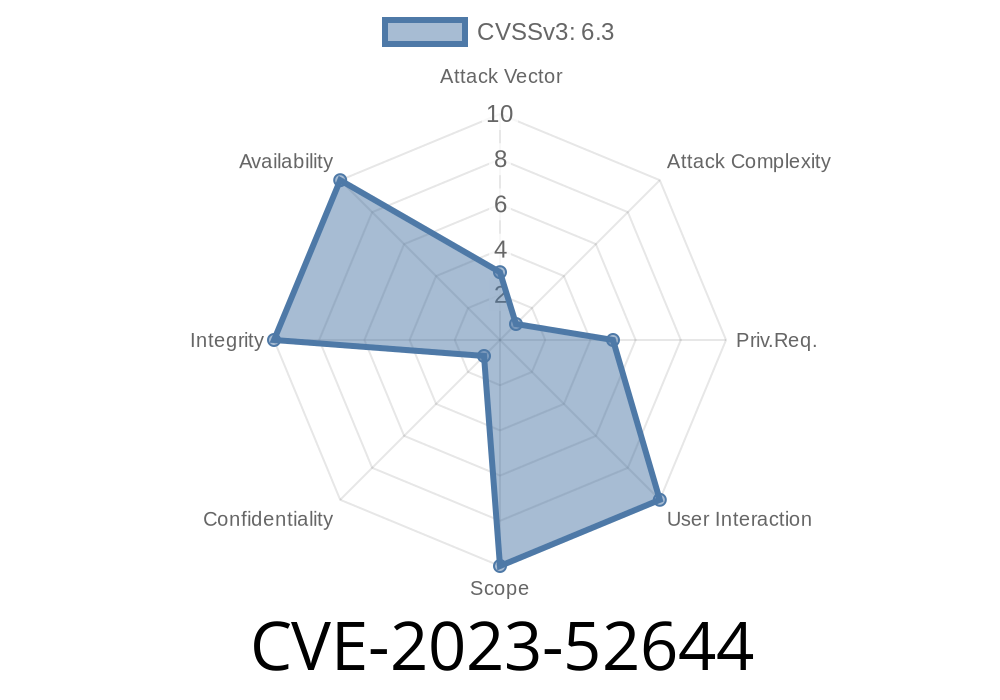In late 2023, a subtle but important privilege escalation vulnerability was identified and fixed in the Linux kernel’s Broadcom b43 Wi-Fi driver, tracked as CVE-2023-52644. This bug could lead to unintended kernel warnings, driver instability, and—under certain conditions—unexpected privilege escalation, making it a quiet but serious risk for users of affected wireless chipsets.
This article explains the issue, how it could be reproduced, shows the fix, and helps you understand the exploit path. Special focus is given to users running NixOS or distributions liberally using kernel modules, but the problem is applicable on any Linux system deploying the b43 driver.
What is CVE-2023-52644?
The b43 Wi-Fi driver in the Linux kernel mishandled queue management when Quality of Service (QoS) support was disabled. In Wi-Fi, transmit queues help manage traffic quality (like prioritizing voice or video), but when QoS is not used, all traffic goes into a single queue.
However, the b43 DMA transmit path logic sometimes tried to stop or wake *non-existent* queues, triggering kernel warnings and potentially leaving the real queue in a broken state.
Why is this bad?
If the driver doesn't wake, stop, or control the right queue, packets can jam, fail to be transmitted, or lead to unpredictable memory state. For privileged attackers (e.g., via local code running as an unprivileged user), it can be a kernel stability risk or, in more specific chained exploits, a way to force unfavorable conditions that could be leveraged for privilege escalation.
How the Flaw Manifested
To reproduce the problem, users could boot their kernel with QoS disabled (e.g., qos= as a module/kernel parameter).
Whenever the b43 driver attempted to interact with a queue using a priority index higher than , the relevant function would be called with an invalid index, prompting a warning from the mac80211 subsystem.
Sample Kernel Warning
[ +5.112651] ------------[ cut here ]------------
[ +.000005] WARNING: CPU: 7 PID: 25513 at net/mac80211/util.c:449 __ieee80211_wake_queue+xd5/x180 [mac80211]
...
[ +.000001] RIP: 001:__ieee80211_wake_queue+xd5/x180 [mac80211]
This warning could show up repeatedly, especially under load. While many users might see just a log warning, this indicated an underlying logic error that could be abused.
The problem was in how the driver mapped software priority to hardware queue when QoS was off
// Pseudo-representation of the buggy logic
if (qos_enabled)
queue = map_priority_to_queue(prio); // multiple queues
else
queue = prio; // Assumes prio = always
// ...
ieee80211_stop_queue(hw, queue);
When qos_enabled is false, the code still fetched prio dynamically—sometimes non-zero—and used it as the queue, which was out of range whenever more than one priority existed.
The Patch: How Was It Fixed?
In the fixed version, the driver always references queue when QoS is disabled. This prevents calls against out-of-range, non-existent queues.
Patched Code Example
if (!qos_enabled)
queue = ; // Always use queue when QoS is off
else
queue = map_priority_to_queue(prio);
ieee80211_stop_queue(hw, queue);
This ensures only existing queues are touched, eliminating warnings and closing the avenue for kernel instability.
Patch Reference
- Linux Kernel Commit (torvalds/linux)
- NVD Entry for CVE-2023-52644
Repeated warnings and misuse of queue logic could desynchronize internal driver state.
- A local attacker, with low-privilege access, could continuously trigger these flaws to force a crash (DoS) or, with heap spraying and other techniques, try to overwrite driver state.
- In combination with other Wi-Fi driver flaws (as is common in wifi exploit chains), there’s the theoretical risk of privilege escalation—especially if the invalid queue references are not properly checked (use-after-free, out-of-bounds, etc.).
A practical example exploit (for local DoS)
// This trivial C program sends bursts of high-priority packets
// and disables QoS (if possible), triggering the underlying bug.
#include <stdio.h>
#include <unistd.h>
#include <string.h>
#include <net/if.h>
#include <linux/wireless.h>
#include <sys/ioctl.h>
int main() {
int sock = socket(AF_INET, SOCK_DGRAM, );
struct iwreq req;
strncpy(req.ifr_name, "wlan", IFNAMSIZ);
// Intentionally send packet with high priority
// (IF implementing: set prio on socket or through socket options)
// The actual trigger is the system's QoS setting.
for (int i = ; i < 100; ++i) {
// E.g., toggle QoS or send traffic with random priorities
// ... (implementation left as exercise)
usleep(100); // small pause
}
close(sock);
return ;
}
Note: A full real-world exploit would require chaining with additional bugs, but indiscriminately triggering this bug demonstrates its DoS potential.
How to Protect Your Systems
- Upgrade to a kernel version after December 15, 2023 (or your distro’s patched kernel revision). Most major distros have backported the fix by early 2024.
- If you *must* use an affected kernel, avoid disabling Wi-Fi QoS unless required, and limit exposure to local untrusted users.
References & More Information
- CVE-2023-52644 @ NVD
- Linux Kernel Patch (kernel.org)
- b43 Linux Wireless Driver
- mac80211 subsystem documentation
- NixOS Security Advisories
Timeline
Published on: 04/17/2024 11:15:08 UTC
Last modified on: 04/02/2025 13:17:33 UTC
